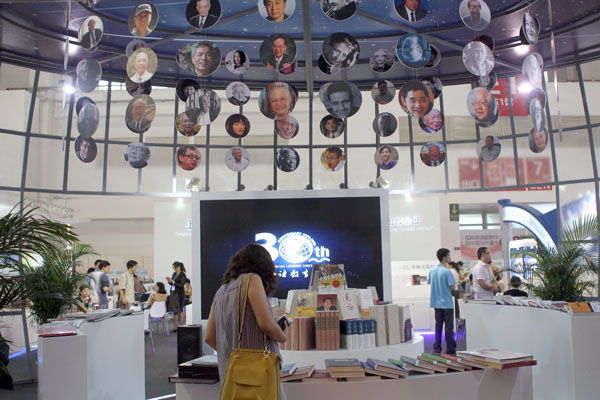 |
|
The Beijing International Book Fair is one of the world's biggest gatherings of books and authors. The five-day event ended on Sunday. Photos by Zou Hong / China Daily
|
A strong group of provincial writers makes literary sense of tradition that comes crashing into a modern world.
Writers from Shandong province, where Confucius was born, brought the freshness of the seacoast to the 2013 Beijing International Book Fair that wrapped up on Sunday.
Following Henan-born writers, the Shandong writers were the second group to be highlighted at the book fair, one of the world's biggest gatherings of books and writers.
Mo Yan, Nobel laureate in literature in 2012, was among the Shandong writers. He often refers to the folk tales passed down through generations in his hometown as an important literary source for his own creations.
"People say Chinese writing has no tradition of magic and fantasy, but I can easily give an example of my fellow Shandong writer of the Qing Dynasty (1644-1911) Pu Songling, from whom I learned much," Mo told a group of German writers who came for literary exchanges on Sunday.
Besides being deeply rooted in rich folk stories and a long history of traditional writing, established Shandong writers like Zhang Wei, author of The Ancient Ship and You're On the Highland, are good at recording the changes of rural China — in a realistic style influenced by prevailing Confucian aesthetics in morality and values, says Li Yeping, a literature professor and a woman Shandong writer.
Quoting Zhao Defa's Buddhist writing as an example, Beijing Normal University's Chinese literature professor Zhang Qinghua says Shandong writers are widely found to have "massiveness and sharpness".
The former is because they've always been dealing with the heaviest and most fundamental topics of all, the land and farmers, and the sharpness comes from their shrewd insight into China's transformation from an agricultural civilization into an industrialized society, Zhang explains.
Regarding Shandong writers' critical analyses of the complications of rural culture, Zhang says they've undertaken ethical responsibilities.
At the book fair, Zhang Wei, also chairman of the Shandong Provincial Writers Association, led a group of younger writers from his hometown to introduce them to the capital's literary scene.
Some are domestic literary-prize winners, some have already published several books.
Most of the younger writers have job experiences in other realms including medicine, law enforcement and mining.
And more women writers are catching the critics' attention.
We recommend:
